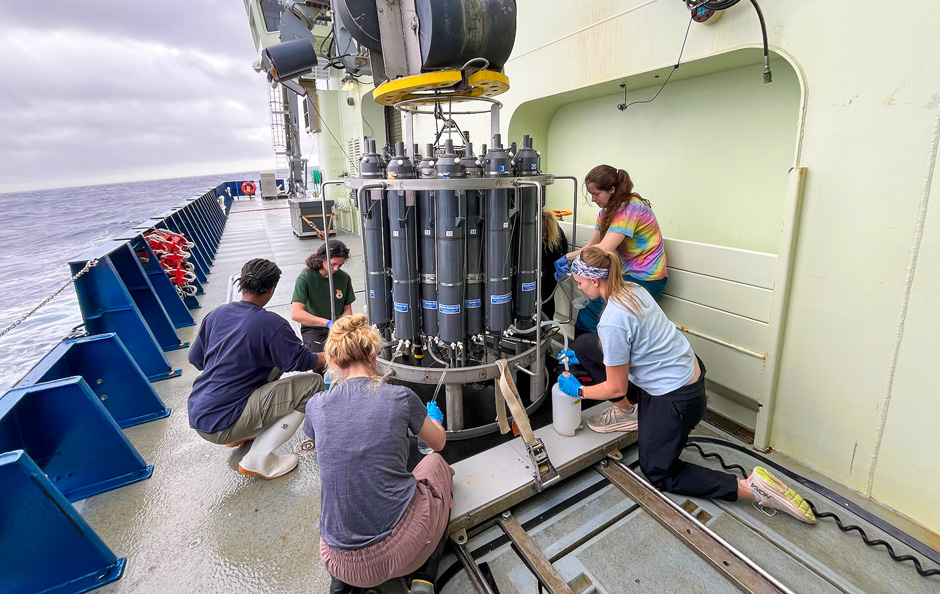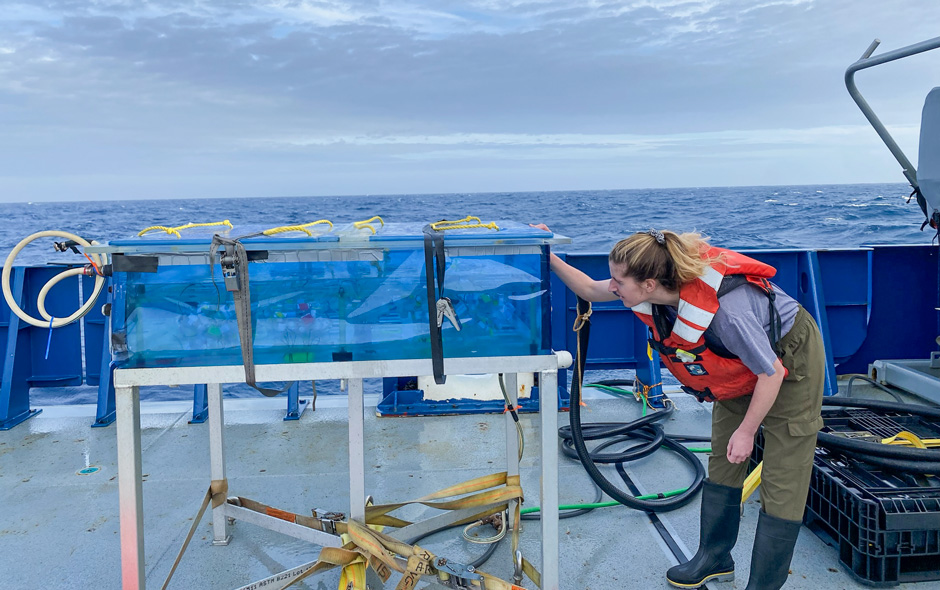By Robert C. Jones Jr., University of Miami News
In a sea teeming with some of the largest creatures on the planet, a University of Miami scientist is studying how big of an impact desert aerosols and volcanic ash have on the sea’s tiniest lifeform — microscopic marine algae that form the foundation of the ocean food web.
“Both desert dust and volcanic ash contain phosphorus, a key element found in the world’s oceans that essentially acts as a fertilizer for the sea,” said Hope Elliott, a Ph.D. student in ocean sciences at the Rosenstiel School of Marine, Atmospheric, and Earth Science. “In sufficient amounts, phosphorus stimulates the production of phytoplankton, microscopic plants that reduce atmospheric carbon dioxide concentrations by performing photosynthesis and form the base of the marine food chain.”
But in some ocean regions, phosphorus exists in low concentrations, raising concerns about the health of the marine ecosystem in those waters. In the surface waters of the North Atlantic, for example, phosphorous levels are so low that they approach amounts that have been documented in the phosphorus-starved eastern Mediterranean Sea, Elliott noted.

“We’ve long known that dust from desert regions can boost phosphorus levels in the ocean,” she said. “But little is known about how much of a role phosphorus from volcanic ash can play in boosting phytoplankton growth.”
So Elliott made it her mission to find out.
She collected aerosol samples from the Godzilla dust storm — a massive Saharan dust cloud that traveled across the Atlantic to North America in June 2020 — as well as samples of ash from the La Soufrière volcanic eruption of 2021, mixing them in seawater taken from the Rosenstiel School docks and then using a spectrophotometer to measure how much phosphorus was released and could potentially be used as fertilizer by phytoplankton.
“We discovered that they both raised concentrations of phosphorus in the water,” Elliott said. “And by tracking the movement of the phosphorus, we found that the phytoplankton do actually digest it.”
But laboratory tests can only tell researchers so much. The true litmus test would come at sea under real-world environmental conditions.
“The marine microbial community at the Rosenstiel School dock is not indicative of what we would see in the open ocean,” Elliott said. “Dust and ash are being deposited over miles and miles of open ocean. So, to study what’s happening to the microbial community over that huge expanse, we really had to go to sea.”
During five days aboard the Woods Hole Oceanographic Institution’s R/V Neil Armstrong in January, Elliott and five other Rosenstiel School graduate and undergraduate students collected a multitude of samples from the waters surrounding Bermuda, exposing the samples to Saharan dust and volcanic ash that had been collected from filters at the Rosenstiel School’s renowned Barbados Atmospheric Chemistry Observatory.
Working long hours, sometimes under rough sea conditions, the students also analyzed those samples aboard ship. “We’re still in the post-processing period and are awaiting the results,” Elliott said.

Her project is among the first of its kind. “As far as we know, hardly anyone has ever measured alkaline phosphatase activity in volcanic material, a very specific kind of measurement related to phosphorous cycling. So, we’re producing some novel measurements that could serve as a baseline,” Elliott said.
“It was very much a collaborative effort,” said Kim Popendorf, associate professor of ocean sciences, who led the team of students who supported Elliott’s project and conducted other research while aboard ship — specifically, determining the drivers of variation in microbial growth efficiency and the impacts of atmospheric deposition of aerosols on microbial productivity.
“For that experiment, we conducted multiple depth profiles to 500 meters measuring microbial metabolic energy turnover rates along with a suite of chemical and microbial community measures,” Popendorf said of the five-day expedition, which was conducted as part of the Bermuda Institute of Ocean Sciences’ Bermuda Atlantic Time-series Study, or BATS, an initiative that has collected data on the physical, biological, and chemical properties of the ocean every month since 1988.
“The time spent on the R/V Neil Armstrong gave me the opportunity to earn valuable experience working with radioisotopes at sea to perform shipboard incubations and phosphorus uptake experiments,” said Phoebe Scharle, a graduate student studying ocean sciences, who sailed on the research cruise.
It was Elliott’s first expedition at sea. Now, the Wisconsin native, who grew up dreaming of becoming a marine biologist, hopes to expand her research.
“Due to climate change, it’s predicted that the emission of natural aerosols — anything that’s not anthropogenic pollution — will increase,” said Elliott, who praised associate professor of atmospheric sciences Cassandra Gaston for guiding her during her research. “That includes mineral dust emissions and wildfire smoke, which can get deposited into ocean regions or lakes. So, we’re expected to see more extreme events and more dust in general going into the ocean, which will impact the nutrient concentrations and the phytoplankton. So, for the future, I hope to look at how atmospheric deposition impacts harmful algal blooms.”
This piece was originally published at https://news.miami.edu/stories/2025/02/a-fertilizer-for-the-sea.html. Banner photo: Aboard the RV Neil Armstrong, Hope Elliott, left, prepares vials of seawater into which Saharan dust particles and volcanic ash were injected (Image courtesy of Hope Elliott/University of Miami).
Sign up for The Invading Sea newsletter by visiting here. To support The Invading Sea, click here to make a donation. If you are interested in submitting an opinion piece to The Invading Sea, email Editor Nathan Crabbe at nc*****@*au.edu.



